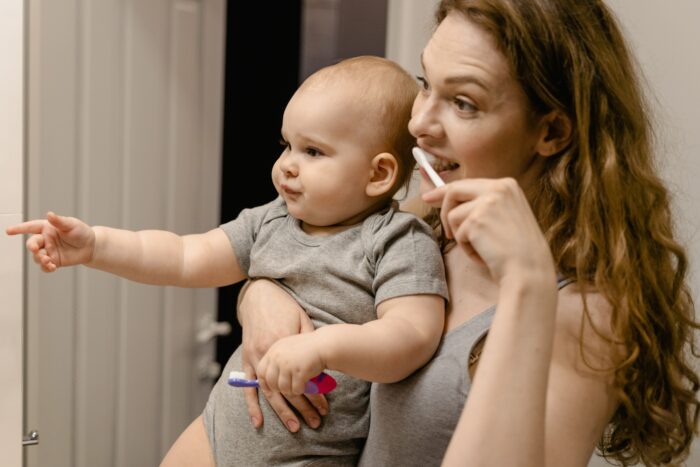
Parents play an important role in establishing good habits for their children early in life. These habits must be encouraged frequently when they are young, and it can be a daunting task in the beginning.
However, by helping them maintain certain habits daily, it ensures that they become an integral part of their lives.
The more your children practice a behavior or habit, the more likely they are to inculcate it properly.
Since children have the immense capacity to absorb and learn, they easily pick up things such as language, habits, and mannerisms from the environment they grow in and see around them. Therefore, we as parents should be very careful about how we behave and what we say when our kids are around us.
As a parent, all your efforts in raising your children are concentrated on helping them become independent, kind, and educated beyond just academic knowledge.
Like every parent, you also may have thought about your child’s future and have planned millions of strategies to help him reach his future goal.
Thus, developing good habits in your child is essential, as they will stay with them for the rest of their lives and will bring lifelong benefits!

1. Start With the Basics
Before anything else, start with teaching your kids some basic manners and proper hygiene:
- Brushing teeth at least twice a day
- Washing hands after meals
- Taking a bath/shower independently
- Dining etiquette, such as no screen time at the table
- Following a bedtime routine
- Introduce them to manners like saying thank you and sorry, politely addressing elders, and making eye contact
2. Be a Role Model For Your Child
One of the best ways to encourage good habits in your children is by setting a proper example yourself. Your child is already learning a great deal just by observing your everyday speech and attitude!
- Watch how much you complain and gossip
- Focus on your own physical and emotional health
- Practice spiritual disciplines, such as Bible reading, prayer, etc.
- Be diligent in your responsibilities
- Serve and honor others
- Try to always have an optimistic frame of mind towards your kid
- Do not show aggression to your child
- Never fight with your spouse in front of your child

3. Teach Your Child a Positive Attitude
The way you speak and how you handle situations matter a lot in the development of good habits in your child. Sometimes he or she makes a big mistake, and it’s tempting to yell at or punish them harshly for it.
A child with toxic parents will have a hard time coping and might be emotionally damaged. Therefore, before shouting at them, handle the situation calmly and explain why he or she is wrong.
- Teach them to learn from mistakes
- Deal with negativity to and about other people
- Talk about failures with your child and how to accept them
- Address character issues
By doing this, you are teaching your son or daughter how to react calmly and positively about disappointing or difficult situations. And being positive is a virtue in a world full of negativity, criticism, and cancellations!
4. Set Strong Ground Rules
As parents, it becomes important to set strong rules for your children, especially when they start their schooling phase.
Sometimes firm parenting and some restrictions are required to create discipline in your child’s life and help them learn responsibility:
- Make a schedule for homework, play, and electronics
- Allocate a specific time for each activity, such as screen time
- Establish a routine of age appropriate chores
However, while setting a schedule, try to make it as flexible as possible. Children should be physically active for at least 3 hours each day. So, do not be too harsh on your child while allocating study time and playtime.

5. Encourage a Healthy Diet
One of the most important things for your child to learn while he or she is growing is how to make healthy food choices. Encourage your child to eat a healthy diet from an early age, as it takes time to adopt such habits.
- Teach them about the importance of having nutritious and healthy meals
- Have them read food labels
- Ask them to distinguish between healthy food and junk food
6. Teach Them to Differentiate Between Right and Wrong
Every parent needs to teach their child the difference between good and bad.
Although you may repeat yourself a lot in the beginning, it’s essential that they clearly know right from wrong, and also why certain things are that way.
- If something happens with your child at school, first listen to their story and then tell him where he did something wrong
- Tell your kids stories about a character who faces both good and bad choices, and ask them their opinion regarding the story
- Show some animated videos with characters that make good and bad decisions, and discuss what they watch with them

7. Reward Your Children For Good Work
Rewarding your child for a good job or behavior is always a great way to show your appreciation. Positive reinforcement will encourage children to behave well consistently.
However, a key point to remember is avoid giving materialistic rewards like toys, candy, money, or extra time to watch TV.
Instead, find another way to appreciate them for their good behaviors:
- Give a hug or a word of appreciation to motivate them
- Take them on an afternoon trip to a favorite place
- Spend some extra time playing with them than you normally do
8. Make Good Connections With Your Child
A strong connection with your kids, as well as regular communication, goes a long way in helping them develop good habits. No matter how busy you are, always make time for your children!
Listen to what’s going on in their lives, analyze their behavior, tell them if you find something wrong, and ask them to improve it.
- Engage them in short conversations throughout the day
- Take your kids for special one-on-one outings
- Encourage them and listen non-critically
- Acknowledge and understand their disappointments

9. Encourage Reading Habits
Reading books or stories is a great way to develop good habits and manners in your child naturally. A habit of reading will help your child with their critical thinking skills as well.
Good literature, especially Christian children’s books, effectively inspires kids to:
- Maintain a good attitude
- Form good manners
- Follow a code of discipline
- Maintain a positive outlook or perspective towards life
10. Show Respect
As parents, if you want your child to respect elders, speak politely with a soft tone to older people. If you want your child to treat others with dignity, then speak highly of them instead of putting them down or criticizing their appearance, actions, etc.
When you want your children to build such etiquette, you should set the example yourself as your child’s behaviors reflect the environment where they are brought up.
- Do not call your child negative names, such as “disaster”, “lazy”, etc.
- Never compare your child with others since everyone is unique
- Trust your child’s capabilities and believe in him or her
- Act humbly and seek forgiveness when you’ve made a mistake
11. Set Realistic Expectations
Finally, don’t expect your child to form good habits overnight. Set realistic expectations.
Don’t forget that your kids are still young and bound to make mistakes.
However, baby steps and learning from failures can gradually change your child’s habits over time, so encourage them to start small and build up. All children learn at their own pace!

Good habits are one of those essential building components for life. The propensity for acceptable social skills and well-mannered behavior is impossible to form within a short period.
It takes time, regular practice, and regular encouragement for good habits to become ingrained. So, the earlier you start teaching these to your children, the easier it will be for them to make such patterns a part of their everyday lives.
They learn by watching their mom and dad, older siblings, and people around them. If there is a mismatch between what you say to your child and what you do, they will most likely do what they see.
It may sound cliché, but children are like clay that can be molded to any shape. Unlike adults, kids have an easier time mending their ways and incorporating new behaviors.
Teaching children to implement good habits at an early age can be a challenging experience, but to set them up for a great future, you need to help and encourage them to form these routines!

Leave a Reply
You must be logged in to post a comment.